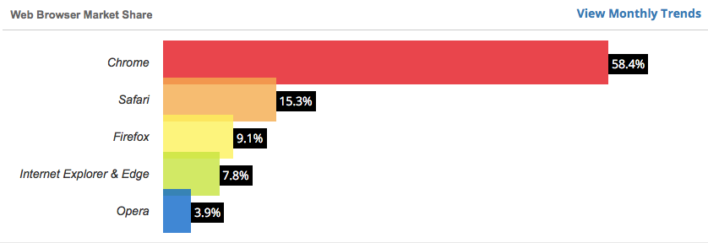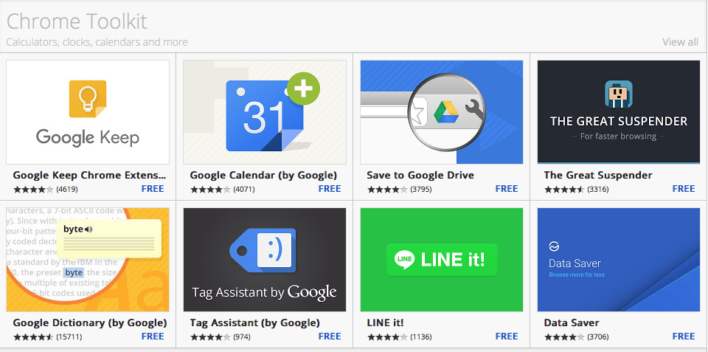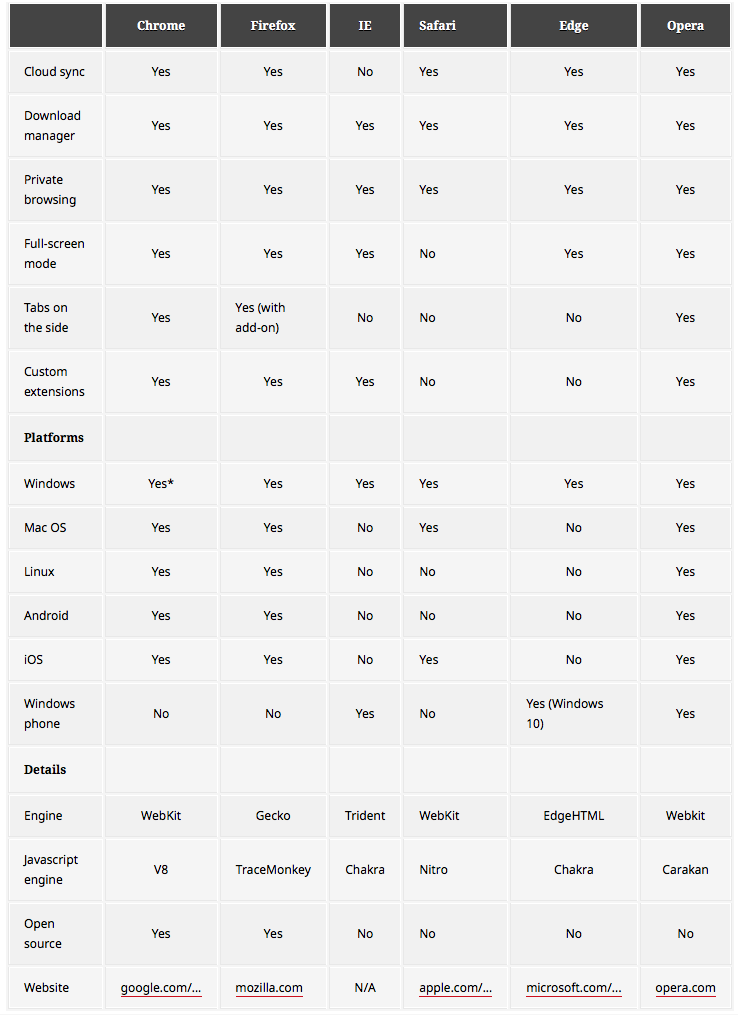- Jan 6, 2017
- 835
It may be the most popular, but is Google Chrome really the best web browser out there? Here are some thoughts, stats, and comparisons for you to chew over.
Google Chrome remains by far and away the most-used web browser, accounting for well over half of all web traffic, according to W3Counter’s latest browser stats, published January 2018.

Browser market share. (Image source: w3counter.com)
But do these stats tell the whole story?
Just because more people use Google Chrome than any other browser, doesn’t necessarily mean it’s the ‘best’. Indeed, many of us simply pick a browser when we have a new device in our possession and stick with it for years. Apple users, for instance, will find Safari pre-installed and ready to go on their new Mac, iPhone or iPad, and many won’t explore other options as perhaps they should.
The truth is that you can download as many browsers as you like – Firefox, Opera, IE, you name it – and finding the right one for you can greatly improve your experience on the web.
But the question remains… Why Is Google Chrome so Darn Popular?
Let’s face facts – the majority of us are fully immersed in the Google ecosystem, and so using Google Chrome makes perfect sense. The browser ties in seamlessly with your Google account, and allows you to sync settings and bookmarks between different devices and computers.
Google Chrome is available for Mac, Linux, Windows, iOS and Android devices, and this cross-platform support makes it hardly a wonder that it proves so enduringly popular.
A frequent update cycle means that any bugs are trampled and security issues weeded out quickly. It manages multiple tabs superbly, intelligently resizing them as necessary, and even provides a pinning option for easy access. Another nifty feature is that Google Chrome also stores tabs in memory separately – meaning that if one crashes, it won’t take the rest down with it.
What’s more, if you find that there’s a feature missing from Google Chrome, or if you’re into adding extra functions to frequently-used websites, there is a huge selection of extensions in the Chrome Web Store where you will almost certainly find everything you need.

Chrome Store. (Image source: chrome.google.com)
What Are the Downsides?
Of course. nothing’s perfect in this world, not even Google Chrome, and there are indeed some potentially big downsides to this web browser.
The main one is that it’s quite heavy, which means it’s not particularly well-suited to machines with limited RAM. If you’ve got an old computer, it may struggle running Google Chrome. The other is the fact that, since it’s a Google product, you may not be entirely comfortable with the ways in which your browsing data may be used.
So, Is Google Chrome the Be All and End All of Web Browsers?
If you want a reliable web browser with top-notch functionality, high speed, a good UX, and decent security, Google Chrome is indeed hard to beat. Google Chrome will also run on all your devices and sync across them, meaning that you can always pick up where you left off when switching between computer, phone, and tablet.
Safari, of course, does this, too – but only with Apple products (older versions are still floating around for Windows, but are no longer supported by Apple, so we don’t recommend you use them).
For comparison, below is a table from Tech Advisor summarising the main features of the most popular web browsers, as well as which platforms each browser supports.

Handy browser camparison table shows main features, at a glance. (Image source: techadvisor.co.uk)
Google Chrome remains by far and away the most-used web browser, accounting for well over half of all web traffic, according to W3Counter’s latest browser stats, published January 2018.

Browser market share. (Image source: w3counter.com)
But do these stats tell the whole story?
Just because more people use Google Chrome than any other browser, doesn’t necessarily mean it’s the ‘best’. Indeed, many of us simply pick a browser when we have a new device in our possession and stick with it for years. Apple users, for instance, will find Safari pre-installed and ready to go on their new Mac, iPhone or iPad, and many won’t explore other options as perhaps they should.
The truth is that you can download as many browsers as you like – Firefox, Opera, IE, you name it – and finding the right one for you can greatly improve your experience on the web.
But the question remains… Why Is Google Chrome so Darn Popular?
Let’s face facts – the majority of us are fully immersed in the Google ecosystem, and so using Google Chrome makes perfect sense. The browser ties in seamlessly with your Google account, and allows you to sync settings and bookmarks between different devices and computers.
Google Chrome is available for Mac, Linux, Windows, iOS and Android devices, and this cross-platform support makes it hardly a wonder that it proves so enduringly popular.
A frequent update cycle means that any bugs are trampled and security issues weeded out quickly. It manages multiple tabs superbly, intelligently resizing them as necessary, and even provides a pinning option for easy access. Another nifty feature is that Google Chrome also stores tabs in memory separately – meaning that if one crashes, it won’t take the rest down with it.
What’s more, if you find that there’s a feature missing from Google Chrome, or if you’re into adding extra functions to frequently-used websites, there is a huge selection of extensions in the Chrome Web Store where you will almost certainly find everything you need.

Chrome Store. (Image source: chrome.google.com)
What Are the Downsides?
Of course. nothing’s perfect in this world, not even Google Chrome, and there are indeed some potentially big downsides to this web browser.
The main one is that it’s quite heavy, which means it’s not particularly well-suited to machines with limited RAM. If you’ve got an old computer, it may struggle running Google Chrome. The other is the fact that, since it’s a Google product, you may not be entirely comfortable with the ways in which your browsing data may be used.
So, Is Google Chrome the Be All and End All of Web Browsers?
If you want a reliable web browser with top-notch functionality, high speed, a good UX, and decent security, Google Chrome is indeed hard to beat. Google Chrome will also run on all your devices and sync across them, meaning that you can always pick up where you left off when switching between computer, phone, and tablet.
Safari, of course, does this, too – but only with Apple products (older versions are still floating around for Windows, but are no longer supported by Apple, so we don’t recommend you use them).
For comparison, below is a table from Tech Advisor summarising the main features of the most popular web browsers, as well as which platforms each browser supports.

Handy browser camparison table shows main features, at a glance. (Image source: techadvisor.co.uk)

